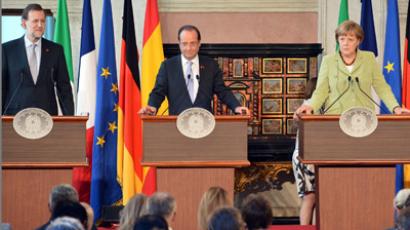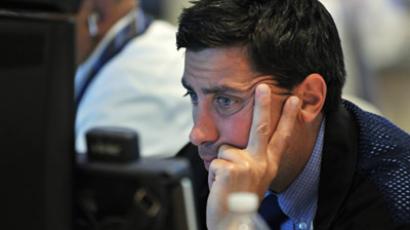‘Eurozone to blow up any time when unable to roll over credits’
Most EU members are in favor of issuing eurobonds, but Germany opposes mutual debt obligations. Don Coxe, an investor and chairman of Coxe Advisors LLP, says Berlin cannot afford to hand out more bailouts when confidence in EU banks is crumbling.
The talks are taking place in Brussels, where EU leaders are meeting for two days to agree on new growth measures for the union.RT: In a recent blog article you wrote that the EU's banks are in imminent danger. Tell us more.Don Coxe: What you’ve got to understand about the euro/dollar market is that banks in Europe, hundreds of them, borrow in loans attached to Libor – we’ve seen now that some of those have been charged a bad rate. Huge amounts of money have come in dollars into their banking system, and then they get swapped into euros. This system has been working reasonably well, but the problem is that the euro is going down, and so therefore a lot of these banks are deciding that they are going to pay off some of their euro loans in dollars. We are talking of unimaginably large amounts of money, certainly north of a trillion dollars. And the American banks who have been making these loans in American funds are getting more and more worried about something going wrong in the euro, which would mean that those swaps couldn’t work.So what we have is a situation, which in the past has always been a real problem, which is where you have a whole region that shorts the dollar, and those loans have to be covered. Last year, American money market mutual funds took back something like $600 billion of money that they had lent on these swaps into Europe. The Federal Reserve said to these money market funds: “This is not good for you to have this much, because you’ve got to have your money at all times at par.”So that was a huge amount of a drain. Now we are looking at more, and it depends who you talk to, how much it is. But this comes at a time, when the perception of crisis in the eurozone is such that more and more banks abroad will be unwilling to roll over their euro/dollar swap loans, and so when you look at Chancellor Merkel’s problems, her own banking system is in serious trouble, and she’s got to think about that first.So the idea of taking precious money and giving it off to these Mediterranean countries – that was never all that appealing. But if what you’ve got is a squeeze on your own banking system, you cannot afford to do that.RT: A year ago it was said the euro would collapse by Christmas. Then it was by Easter – now it's by the end of the summer. Isn't the eurozone being given less credit than it deserves as it's proving a survivor?DC: It’s surviving because it’s able to roll over all these credits. When you’ve had that huge expansion of the Fed’s balance sheet of banks around the world, what you have is money being created there, and a lot of that going in, because there’s a need for it elsewhere. So the problem comes as soon as Central Banks, or banking systems abroad, start to worry and they say: “We won’t renew our credits with these banks in Europe because one of those things we don’t know about is how stable they are. Every time we are told that they’ve done an inspection we find out more are going to bust.”RT: Could we not see the global economies rallying in support the eurozone at this time of crisis, rather than running away from it?DC: Remember that the decision to “run away from it” is being made by banks outside, who are worried about their own financial position. And when you have that kind of fear – all crises come when confidence is replaced by fear. And one of the confidences we had about all this money poured into European banks was that the European governments would bail out their own banks. Now we are seeing this crisis meeting where the question of how much more bailing out is going to be done is really on the table. So naturally banks abroad … Look, the money you make on a loan like this is 1/8 to 1 per cent. The easiest thing to do is just not to roll over the credit…this could blow up any time.














